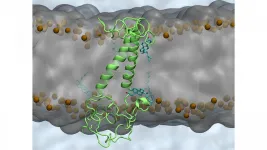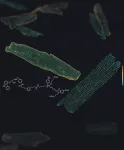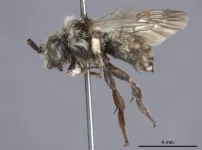(Press-News.org) WASHINGTON, June 15, 2021 -- Alzheimer's disease is predominant in elderly people, but the way age-related changes to lipid composition affect the regulation of biological processes is still not well understood. Links between lipid imbalance and disease have been established, in which lipid changes increase the formation of amyloid plaques, a hallmark of Alzheimer's disease.
This imbalance inspired researchers from Aarhus University in Denmark to explore the role of lipids comprising the cellular membranes of brain cells.
In Biointerphases, by AIP Publishing, the researchers report on the significant role lipids may play in regulating C99, a protein within the amyloid pathway, and disease progression. Lipids have been mostly overlooked from a therapeutic standpoint, likely because their influence in biological function is not yet fully understood.
Toxic amyloid plaques are formed within the brain when a series of enzymes cleave the protein APP, which sits within the neuronal cell membrane, to form C99, which in turn is cleaved to release the amyloid-beta peptide that can form plaques.
Both C99 and APP are able to protect themselves from cleavage by forming homodimers, a protein composed of two polypeptide chains that are identical. The interaction between C99 molecules is regulated by lipids that make up the membrane in which the protein sits.
"We showed that a change in the cholesterol content of the neuronal cell membrane can change how the C99 dimerizes," said Amanda Dyrholm Stange, one of the authors. "Our work suggests age-related changes to cholesterol content in the membrane weakens the C99-C99 interaction, which consequently decreases the 'protective' effect of the dimerization process, leading to the hypothesis of why more toxic amyloid-beta peptides are released in the elderly."
Therapeutics for Alzheimer's disease currently "have a very high failure rate, with no therapeutics developed for a very long period of time, so a novel strategy is desperately needed," said co-author Nils Anton Berlund. "Attempting to modulate the composition of the lipid membrane would be an entirely new class of Alzheimer's disease therapeutics but also immensely challenging without side effects."
The researchers postulate shifting the strategy away from targeting proteins to instead targeting the lipid concentration of membranes may be worthwhile.
"We hope our work will lead the pharmaceutical/biotechnology sector to choose lipid modulation as a means for targeting in drug development, because these changes in lipid composition are linked not just to Alzheimer's but a large host of diseases -- from diabetes to cardiovascular disease," said co-author Birgit Schiøtt. "We also hope it will lead to more research and funding toward understanding the fundamental science behind the possible regulatory roles of lipids."
INFORMATION:
The article "The effect of cholesterol on the dimerization of C99--a molecular modeling perspective" is authored by Amanda Dyrholm Stange, Jenny Pin-Chia Hsu, Lisbeth Ravnkilde Kjølbye, Nils Anton Berglund, and Birgit Schiøtt. The article will appear in Biointerphases on June 15, 2021 (DOI: 10.1116/6.0000985). After that date, it can be accessed at https://aip.scitation.org/doi/10.1116/6.0000985.
ABOUT THE JOURNAL
Biointerphases, an AVS journal published by AIP Publishing, emphasizes quantitative characterization of biomaterials and biological interfaces. As an interdisciplinary journal, a strong foundation of chemistry, physics, biology, engineering, theory, and/or modelling is incorporated into originated articles, reviews, and opinionated essays. See https://avs.scitation.org/journal/bip.
ABOUT AVS
AVS is an interdisciplinary, professional society with some 4,500 members worldwide. Founded in 1953, AVS hosts local and international meetings, publishes four journals, serves members through awards, training and career services programs and supports networking among academic, industrial, government, and consulting professionals. Its members come from across the fields of chemistry, physics, biology, mathematics, engineering and business and share a common interest in basic science, technology development and commercialization related to materials, interfaces, and processing.
A tickle in the nose can help trigger a sneeze, expelling irritants and disease-causing pathogens. But the cellular pathways that control the sneeze reflex go far beyond the sinuses and have been poorly understood. Now, a team led by researchers at Washington University School of Medicine in St. Louis has identified, in mice, specific cells and proteins that control the sneeze reflex.
"Better understanding what causes us to sneeze -- specifically how neurons behave in response to allergens and viruses -- may point to treatments capable of slowing the spread of infectious respiratory diseases via sneezes," said Qin Liu, PhD, an associate professor of anesthesiology and the study's senior investigator.
The findings are published June 15 in the journal ...
Research led by the University of Kent and the STFC Rutherford Appleton Laboratory has resulted in the discovery of a new rare topological superconductor, LaPt3P. This discovery may be of huge importance to the future operations of quantum computers.
Superconductors are vital materials able to conduct electricity without any resistance when cooled below a certain temperature, making them highly desirable in a society needing to reduce its energy consumption.
Superconductors manifest quantum properties on the scale of everyday objects, making them highly attractive candidates for building computers which use quantum physics to store data ...
In the heart there are two different subtypes of beta-adrenergic receptors - beta1 and beta2 - which are activated by the stress hormones adrenaline and noradrenaline. They both trigger the strongest stimulation of the heart rate and pumping capacity that we know of. The two subtypes are highly similar biochemically, but differ substantially in terms of their functional and therapeutic relevance.
Both receptor types can stimulate the heart in the short term, yet when the beta1 receptor is activated over a prolonged period of time, it has a range ...
DUBLIN, June 15, 2021 - Scientists have identified how and why some Covid-19 patients can develop life-threatening clots, which could lead to targeted therapies that prevent this from happening.
The work, led by researchers from RCSI University of Medicine and Health Sciences, is published in the END ...
A new antibody testing study examining samples originally collected through the National Institutes of Health's All of Us Research Program found evidence of SARS-CoV-2 infections in five states earlier than had initially been reported. These findings were published in the journal Clinical Infectious Diseases. The results expand on findings from a Centers for Disease Control and Prevention study that suggested SARS-CoV-2, the virus that causes COVID-19, was present in the U.S. as far back as December 2019.
In the All of Us study, researchers analyzed more than 24,000 stored blood samples contributed ...
Chemotherapy kills tumour cells by causing damage to them. One of the most effective ways of causing damage is to prevent the two DNA strands from separating so that the cellular machinery cannot read the instructions written in the genes. But sometimes, the cell manages to repair the damage and survive, evading the effect of chemotherapy. CNIO researchers have found out how the cell does that and plan to use this knowledge to enhance cancer treatments.
The key lies in a peculiar protein called PrimPol, as explained in a publication in The EMBO Journal by the CNIO's DNA Replication Group, led by Juan Méndez.
The DNA molecule harbours the genes that direct the life of the cell and, ...
The University of Ottawa has been awarded four new Canada Research Chairs (CRC) that will strengthen its expertise in artificial intelligence, health and law. The University is also proud to announce the renewal of two CRCs that will conduct leading-edge research in quantum communications and photonics.
"The Canada Research Chairs Program provides invaluable support to our researchers as they forge their paths of discovery at a world-class level," said Sylvain Charbonneau, vice-president, research. "The results of this most recent competition will ...
A review of more than 9,000 U.S. patients with severe COVID-19 infection showed less than 1% contracted the illness again, with an average reinfection time of 3.5 months after an initial positive test. Those are the findings from a study conducted by researchers from the University of Missouri School of Medicine and MU Health Care.
The researchers teamed up with the MU Institute for Data Science and Informatics and the Tiger Institute for Health Innovation to review data from 62 U.S. health care facilities. They found 63 of the 9,119 patients (0.7%) with severe COVID-19 infection contracted the virus a second time, with a mean reinfection period of 116 days. Of the 63 who were reinfected, two (3.2%) died. Patients categorized as ...
Plants evolve specialised defence chemicals through the combined effects of genes, geography, demography and environmental conditions, a study published today in eLife reports.
The findings reveal a pattern in the types of defence chemicals plants produce across Europe, and describe some of the evolutionary processes that create them.
As plants are immobile organisms, they rely on producing defence chemicals called specialised metabolites for survival. Specialised metabolites have extensive variation in their structure, such as the number of carbon molecules ...
June 15, 2021 - Canadian researchers have discovered that a bee thought to be one of the rarest in the world, as the only representative of its genus, is no more than an unusual specimen of a widespread species.
Scientists with the Canadian Museum of Nature (CMN) and York University have reclassified the mystery bee, collected somewhere in Nevada in the 1870s, as Brachymelecta californica. They note that it's an aberrant individual of a species, the California digger-cuckoo bee, that is part of a group that includes five other species. All are cleptoparasitic bees, with females that lay eggs in the nests of digger bees. Brachymelecta californica itself is known to be widespread ...






